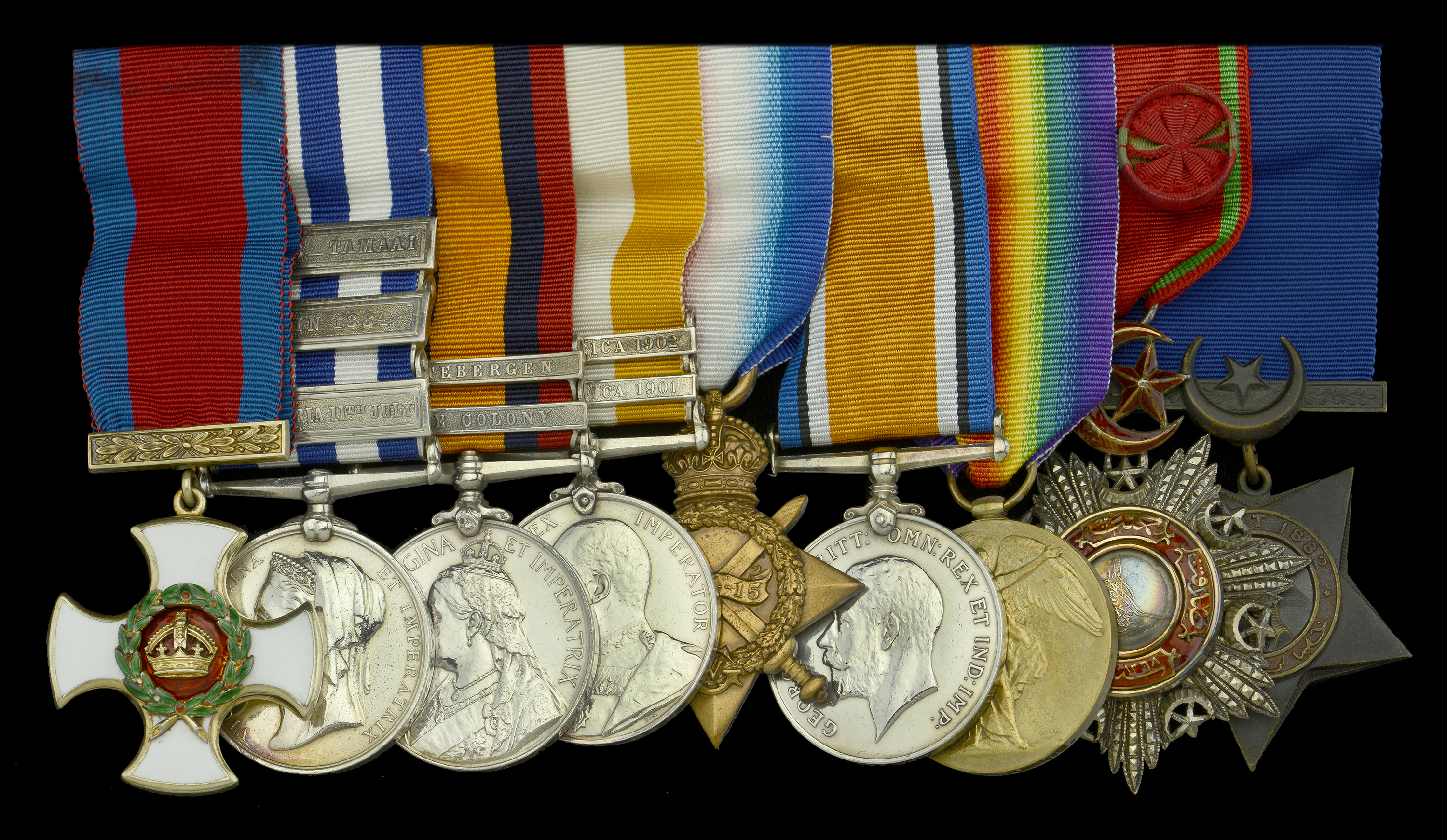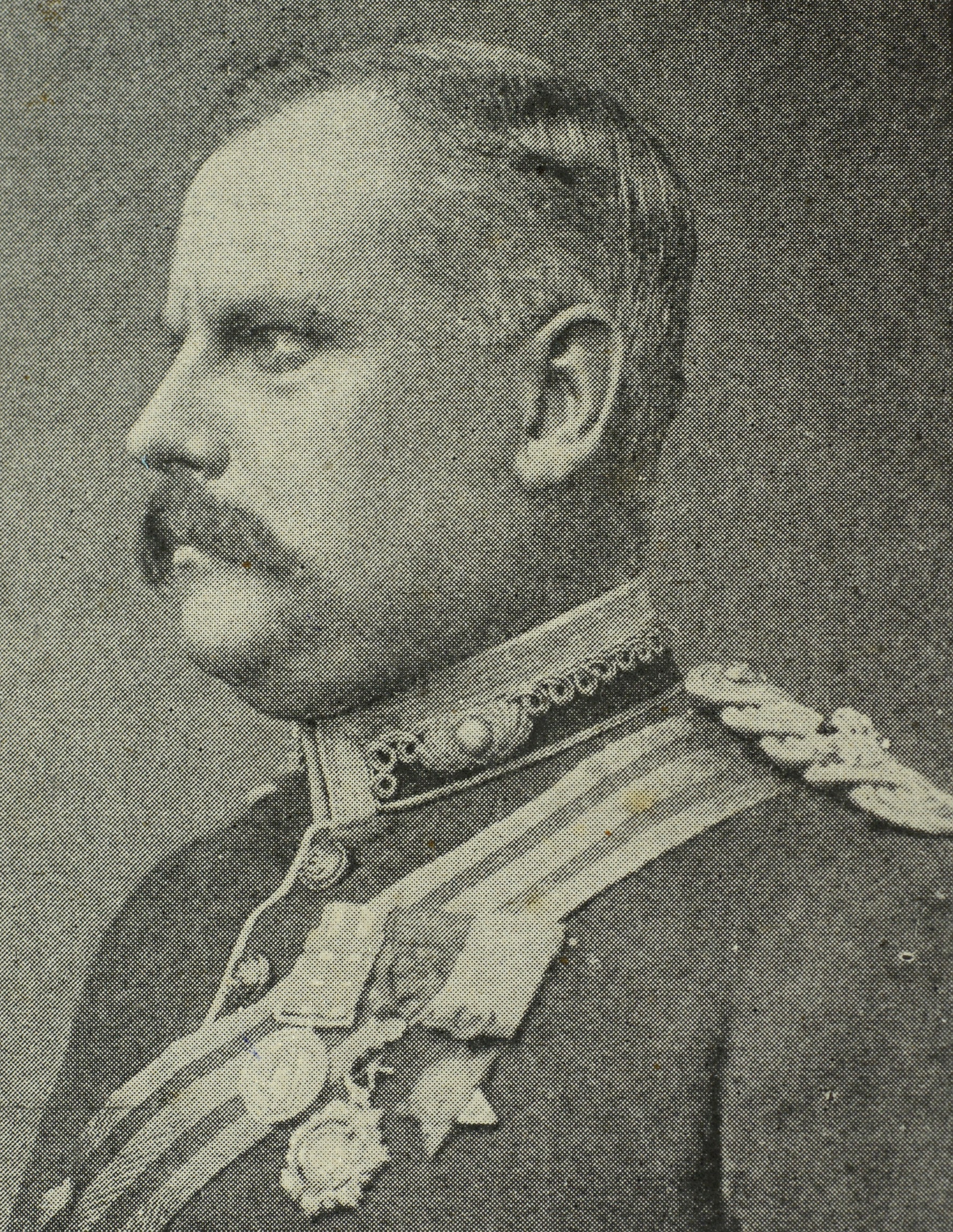The unique Boer War ‘defence of Ladybrand’ D.S.O. group of nine awarded to Colonel F. White, Royal Marine Light Infantry; a taste of his mettle in action first emerged at the battle of El-Teb, when he charged headlong into an enemy redoubt and cut down an assailant with his sword, prior to being rescued by four of his men, one of whom ‘clubbed and brained’ another assailant with the butt of his rifle - all five were duly ‘mentioned’ by Colonel Tuson Small wonder then that Commandant Fourie and his Boer Commando was told where to go on offering White an opportunity to surrender his vastly outnumbered garrison at Ladybrand in September 1900, the resultant defence winning the latter the D.S.O. and the admiration of Sir Arthur Conan Doyle Distinguished Service Order, V.R., silver-gilt and enamels; Egypt and Sudan 1882-89, dated reverse, 3 clasps, Alexandria 11th July, El-Teb_Tamaai, Suakin 1884 (Lieut: F. White. R.M.L.I. H.M.S. “Temeraire”; Queen’s South Africa 1899-1902, 2 clasps, Cape Colony, Wittebergen (Major F. White. R.M.L.I.); King's South Africa 1901-02, 2 clasps, South Africa 1901, South Africa 1902 (Lt. Col. F. White. D.S.O. R.M.L.I.); 1914-15 Star (Bt. Col. F. White. D.S.O.); British War and Victory Medals (Bt. Col. F. White.); Ottoman Empire, Order of the Medjidie, 4th Class breast badge, silver gold and enamels; Khedive's Star, dated 1882, mounted for wear, minor chipping and light contact marks, generally very fine or better (9) £8,000-£10,000 --- Importation Duty This lot is subject to importation duty of 5% on the hammer price unless exported outside the UK --- --- Provenance: Dix Noonan Webb, April 1995. Just four D.S.O.s were awarded to the Royal Marines for the Boer War. D.S.O. London Gazette 27 September 1901. Frederick White was born on 14 October 1861, the son of the late Major George White, R.M.L.I., and was himself commissioned in the Royal Marine Light Infantry in February 1879. He subsequently served in the Egyptian Expedition of 1882, taking part in the bombardment of Alexandria, the occupation of the lines of the town, and the occupation of Port Said. White again saw active service in the Sudan in 1884 when he was present at the battles of El-Teb and Tamaai, and the relief of Tokar, for which services he received the Order of Medjidie and was also mentioned in Colonel Tuson’s despatch for El-Teb: ‘Lieutenant White was personally ordered by the Major-General Commanding to charge the left redoubt of the enemy’s position at Teb with his company. He rushed to the front, when two of the enemy sprang on him, one on each side. He cut one man down twice with his sword, when Private Birtwhistle rushed to his assistance and forced his bayonet right through the black, breaking it short off. The black then severely wounded Private Birtwhistle, who clubbed his musket and brained him. The other black was stopped attacking Lieutenant White by Private F. Yerbury, who caught the man by the hair of his head, spinning him round and round so that he could not use his assegai, when Sergeant-Major Hirst rushed to the front and despatched him. Those four were also in a dangerous position in front of the attack at the time, as the fire from the side of the square was still continued on each side of them.’ Advanced to Captain in August 1888 and to Major in September 1896, White served on the Staff of the Royal Marines from June 1896 to February 1899, prior to his D.S.O. winning exploits in the Boer War. During that conflict he acted as a Special Service Officer from February 1900 until April 1902, his assorted appointments including those of Deputy Assistant Adjutant General at the Headquarters in Cape Town, Railway Staff Officer at Sterkstroom, Commandant at Bethulie Bridges, and a District Command under the Military Governor of Orange River Colony. Present in operations in the Orange River Colony, including the action at Wittebergen, he was mentioned in the despatches (London Gazette 19 September 1901, refers). He received the Queen’s Medal with the clasps ‘Cape Colony’ and ‘Wittebergen’, the latter being one of only seven issued to Royal Marine personnel, three of them to officers of which White was the most senior; his King’s Medal with two clasps was one of just 11 awarded to the Royal Marines. But it was for his gallant defence of Ladybrand that he was awarded the D.S.O., an action admiringly described by Sir Arthur Conan Doyle in The Great Boer War: ‘On 2 September another commando of Free State Boers under Fourie emerged from the mountain country on the Basuto border and fell upon Ladybrand, which was held by a feeble garrison consisting of one company of the Worcester Regiment and 43 men of the Wiltshire Yeomanry under the overall command of Major F. White. The Boers, who had several guns with them, appear to have been the same force which had been repulsed at Winburg. Major White, a gallant Royal Marine, whose fighting qualities do not seem to have deteriorated with his distance from salt water, had arranged his defences upon a hill, after the Wepener model, and held his own most stoutly. So great was the disparity of the forces employed that for days acute anxiety was felt by the General Staff lest another of those humiliating surrenders should interrupt the record of victories and encourage the Boers to further resistance. The Boer attack was beaten back each time by the constancy of the British defence. The thin line of 150 soldiers, covering a mile and a half of ground, endured a heavy shell and rifle fire with unshaken resolution, repulsed every attempt of the burghers and held the flag flying until relieved three days later by the forces under Generals White and Hamilton.’ Another account of White’ stoic defence of Ladybrand appears in The Times History of the War in South Africa 1900-1902: ‘This little post was held by 80 men of the 1st Worcester Regiment, 43 Wiltshire Yeomanry, and 30 local volunteers, the whole under the command of Major F. White, R.M.L.I. On the evening of September 1st, a patrol came in with a report of the approach of the enemy from Modderpoort, and on the 2nd, at 7.30 a.m., a letter, signed by Commandant Fourie, was sent in asking for the immediate surrender of the garrison. White, having replied that if Fourie wanted the garrison he had better come and take it, posted the whole of his slender force on an intrenched hill to the south-west of the town. Fourie, with 800 men, opened shell and rifle fire, worked up to the post, and surrounded it on all sides. For three days and nights, however, the little garrison held firm. Of the Worcesters, Lieutenants Dorman and Moss and Corporal Kirkham, and of the Yeomanry Lieutenant Henderson and Sergeant-Major Lyford deserve special mention in this very fine defence, which Major White directed with marked resolution and ability. The town was relieved by Bruce Hamilton on the morning of September 5th.’ White was awarded the D.S.O., in addition to being mentioned in Lord Robert’s despatch of 4 September 1901. Advanced to Lieutenant-Colonel in April 1903 and awarded the Brevet of Colonel in April 1906, he retired in the rank of Colonel in April 1909. Recalled for service on the outbreak of hostilities in August 1914, he served as a Draft Conducting Officer from 1915-19. The Colonel died at his home at St John’s Park, Blackheath in December 1924. Sold with copied record of service and other research.









